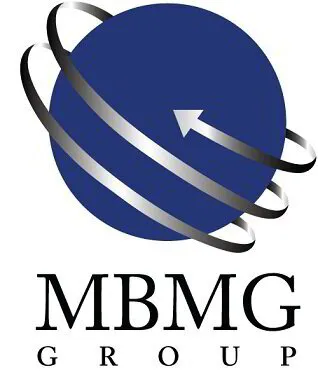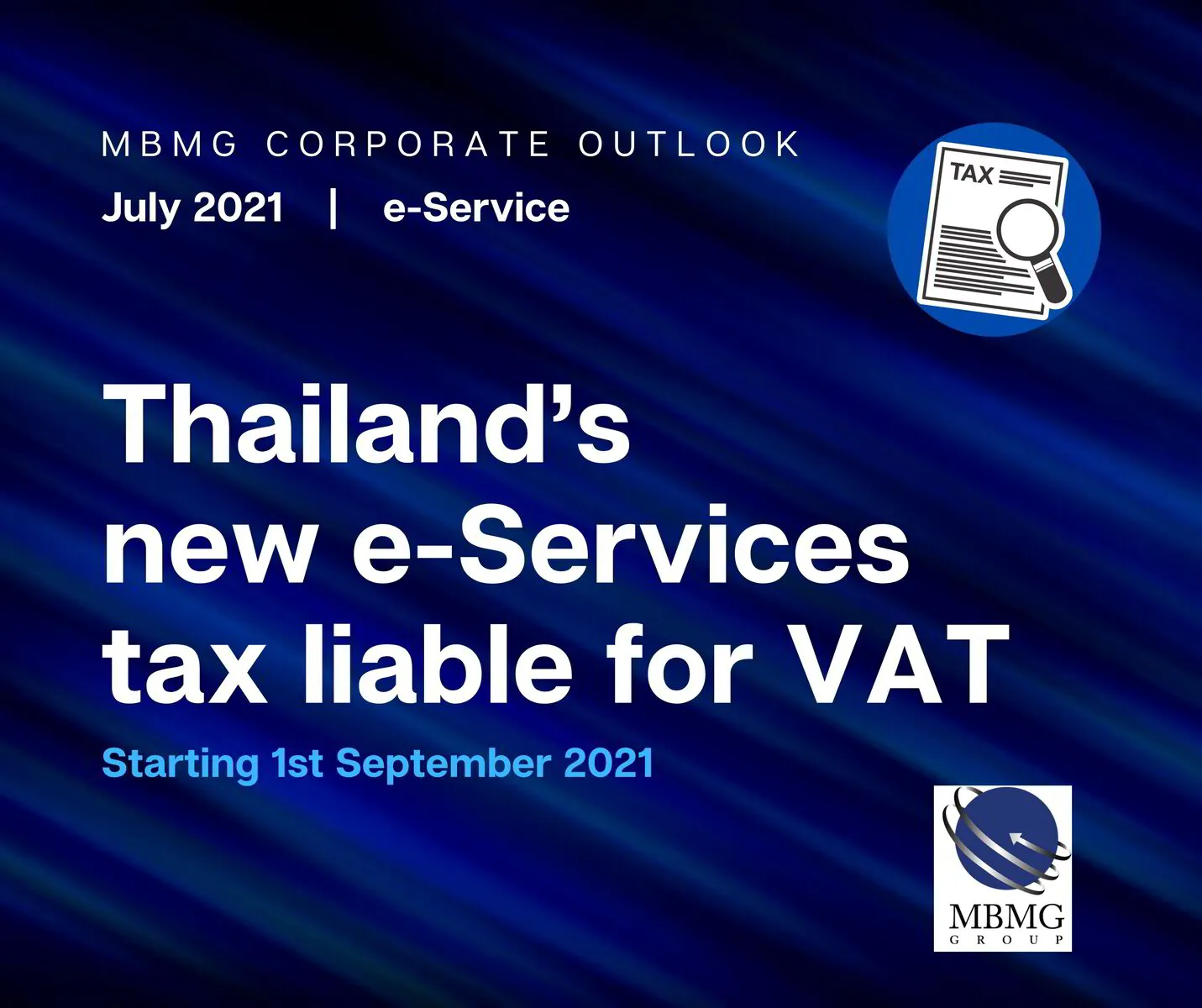Starting from September this year, foreign e-commerce businesses will be liable for 7% VAT on services provided to customers in Thailand. In addition to boosting VAT collections, the law aims to create a level playing field for domestic and foreign operators providing services online to Thai customers.
WHAT IS E-SERVICE TAX?e-Service Tax or Electronic Service Provider Act abroad for domestic service recipients. It is an Act approved by the Cabinet and announced in the Government Gazette on February 10, 2021 but this new tax law shall be enforced on September 1, 2021 and onwards.
According to the Amendment of Revenue Code (Issue No. 53) 2021, the overseas entrepreneurs/service providers who provide e-service via internet network, including any medium providing an online platform between entrepreneurs/service providers and customers, who have a revenue derived from e-service in Thailand more than THB 1,800,000.00 per annum, must register VAT and submit the monthly VAT to the Revenue Department (RD) under the pay-only system (no claiming of input tax) which is not allowed to issue a tax receipt but does not have to submit a report of input tax to the RD.
The Revenue Department has aimed to develop taxation practices in line with international standards set by the Organization for Economic Cooperation and Development (“OECD”), with more than 60 countries including Australia, New Zealand, Japan, Taiwan, and South Korea already adopting similar practices in accordance with the OECD’s recommendations.
This amendment to E-VAT rules redefined the meaning of e-Service as follows:
- The definition of goods is excluded from intangible property transferred through an electronic network.
- e-Services are defined as any service, including intangible property which is automatically transferred via the internet or other electronic networks, and such service cannot be rendered without information technology, for instance, online downloading of game, music, movie, or sticker.
- e-Platform is defined as any of marketplaces, channels or any other methods used by several operators to provide e-Service to its service recipients,
On its Facebook page, the Revenue Department provides examples (in Thai language) of electronic services that fall under the e-Service Tax Law to include online downloading of games, music or movies; stickers sold in chat applications; streaming services; and advertising services on webspace or applications.
e-Service businesses expected to be affected include:
- Online streaming music, movies, series, games.
- Online shopping platform, marketplaces, channels.
- Online investments, finances.
- Online reservation of airlines, hotels, tourisms.
- Online media, advertising, applications and websites
- Sticker downloads
- Others
The Revenue Department also provided examples of the affected “electronic platforms” which included include Apple, Google, Facebook, YouTube, Line, Joox, Netflix and TikTok.
PERSONS LIABLE TO REMIT VAT ARE DIVIDED INTO TWO CATEGORIES:
- Foreign e-Service providers providing services from abroad to non-VAT registered customers that use such services in Thailand.
- Electronic platform owners, who are liable to VAT instead of the foreign suppliers operating on their platform, providing services electronically to non-VAT registered customers that use such services in Thailand.
E-service providers who fall under the above criteria are required to register for VAT and remit VAT every month, similar to domestic businesses. However, such e-Service providers are prohibited to issue tax invoices.
This will be a “pay-only” system meaning that service providers will be liable to VAT on revenues but cannot offset VAT paid on expenditures.
HOW TO MANAGE VAT IN THE OVERSEAS?
As a result, these overseas companies are required to register VAT with the Revenue Department of Thailand and remit output VAT on income derived from users in Thailand, but there is no requirement for issuing a tax invoice. Regarding VAT computation purposes, overseas e-businesses operators are not allowed to claim any input tax.
The Revenue Department is in the process of developing a system call “Simplified VAT System for e-Service (SVE)”, to allow those oversea businesses to register, to submit a form, and to settle the VAT payment via www.rd.go.th
-------------------
HOW WILL E-SERVICES TAX IMPACT YOUR ONLINE BUSINESS?
CASE STUDY – ‘IN THE CLOUD SERVICES’
Our fictitious company “In the Cloud Services” (“ITCS”) is based in the US and is trying to increase its online business footprint in Thailand. The company’s physical servers are all located in the US and the company does not have any office or staff in Thailand.
The company has a variety of online businesses and provides them to customers in Thailand – both to businesses (B2B) and consumers (B2C), including the following:
- Online cloud storage services and providing digital content streaming services
- Selling products through their US-based platform (Sample of case studies)
- Platform services to online sellers
1. ONLINE CLOUD STORAGE SERVICES AND PROVIDING DIGITAL CONTENT STREAMING SERVICES
The company provides online cloud storage and digital content streaming services to its customers in Thailand who are both Thai consumer (B2C) and Thai VAT-registered entities (B2B). Customers in Thailand simply subscribe for these online services through ITCS’ website and pay online for these services by monthly subscription.
Although the services and the fees charged to its customers are the same, the tax implications and treatment of both transactions are different, as illustrated by the pictures below.
a. B2C as a service recipient

b. B2B as a service recipient

2. ONLINE SALE OF PRODUCTS:
ITCS operates an online platform selling a wide range of products to both Thai consumers and Thai entities.
Once products are ordered online, ITCS arranges the shipments, clearance in Thailand, and delivery to its customers (both consumers and companies) in Thailand. The customs clearance and delivery of products are carried out by a local Thai company.
Selling of goods online is currently not covered by the proposed e-services tax. However, there may be other considerations relevant to ITCS, such as whether or not the Thai local company might be considered an agent from a VAT perspective, which could lead to a taxable presence in Thailand.

3. USE OF ITS PLATFORM:
ITCS also allows other online retailers to sell their products online to both Thai consumers and Thai entities through its platform. In return for using its platform, ITCS charges these online retailers a service/commission fee. The tax implications and treatments are illustrated below.
WHAT SHOULD COMPANIES DO TO PREPARE THEMSELVES PRIOR TO THE ENFORCEMENT OF E-SERVICES TAX?
Although there is still time before the e-Services tax is implemented, it would be prudent for foreign service providers/platforms to already start mapping out their online service activities and determine which ones are affected by the new e-Services tax.
At MBMG GROUP, OUR TEAM CAN SUPPORT YOU
What Our Client's say
"Thanks for your kind support over the last night for us"
We really appreciate for the MBMG have fast support for this document.
Client Note
The Nation
Please Note: While every effort has been made to ensure that the information contained herein is correct, MBMG Group cannot be held responsible for any errors that may occur. The views of the contributors may not necessarily reflect the house view of MBMG Group. Views and opinions expressed herein may change with market conditions and should not be used in isolation.


